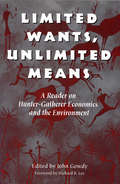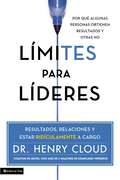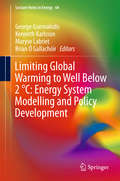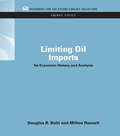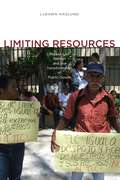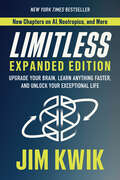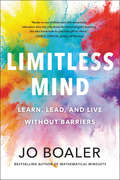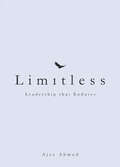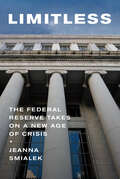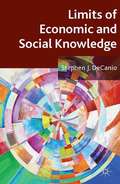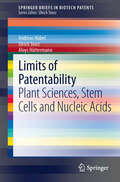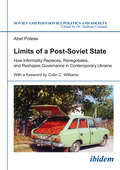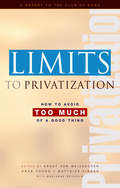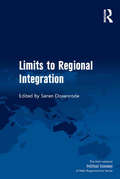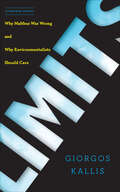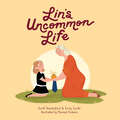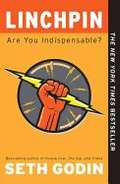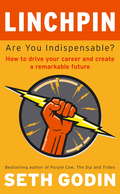- Table View
- List View
Limited Wants, Unlimited Means: A Reader On Hunter-Gatherer Economics And The Environment
by John GowdyFor roughly 99% of their existence on earth, Homo sapiens lived in small bands of semi-nomadic hunter-gatherers, finding everything they needed to survive and thrive in the biological richness that surrounded them. Most if not all of the problems that threaten our own technologically advanced society -- from depletion of natural capital to the ever-present possibility of global annihilation -- would be inconceivable to these traditional, immediate-return societies. In fact, hunter-gatherer societies appear to have solved problems of production, distribution, and social and environmental sustainability that our own culture seems incapable of addressing.Limited Wants, Unlimited Means examines the hunter-gatherer society and lifestyle from a variety of perspectives. It provides a brief introduction to the rich anthropological and sociological literature on non-agricultural societies, bringing together in one volume seminal writings on the few remaining hunter-gatherer cultures including, the !Kung, the Hadza, and the Aborigines. It examines the economics of traditional societies, and concludes with a multifaceted investigation of how such societies function and what they can teach us in our own quest for environmental sustainability and social equality.Limited Wants, Unlimited Means is an important work for students of cultural anthropology, economic anthropology, environmental studies, and sustainable development, as well as for professionals, researchers, and anyone interested in prehistoric societies, environmental sustainability, or social justice.
Limited-dependent and Qualitative Variables in Econometrics
by G. S. MaddalaThis book presents the econometric analysis of single-equation and simultaneous-equation models in which the jointly dependent variables can be continuous, categorical, or truncated. Despite the traditional emphasis on continuous variables in econometrics, many of the economic variables encountered in practice are categorical (those for which a suitable category can be found but where no actual measurement exists) or truncated (those that can be observed only in certain ranges). Such variables are involved, for example, in models of occupational choice, choice of tenure in housing, and choice of type of schooling. Models with regulated prices and rationing, and models for program evaluation, also represent areas of application for the techniques presented by the author.
Limites para lideres: Resultados, relaciones y estar ridículamente a cargo
by Henry CloudEn 1992, el Dr. Henry Cloud publicó «Límites» el cual vendió más de 2 millones de ejemplares en Inglés. En el transcurso de la última década, el trabajo del Dr. Cloud se ha expandido para incluir actividades de entrenamiento con líderes de empresas. Ha encontrado que el concepto de límites es especialmente impactante en grupos de empresarios, por lo que aquí, en «Límites para los líderes», aplica los mismos principios de límites utilizados en el lugar de trabajo, mostrando así a los líderes cómo utilizar estas herramientas y técnicas para desarrollar una cultura organizativa, para crear expectativas de rendimiento conjunto, liderar equipos, clarificar valores y administrar sus propios comportamientos. ¿Qué es un límite? En pocas palabras, un límite es una línea de propiedad. Define dónde termina una cosa y comienza la otra. Da estructura e identidad. Define la propiedad, el control y responsabilidad. Establece límites sobre las conductas y actividades que se permitirán en dicha propiedad. Del mismo modo, el éxito de un líder depende de la manera en que los límites son delineados y definidos. Y cuando los líderes establecieron límites apropiados, las organizaciones prosperan. «Límites para Líderes», es una lectura esencial para ejecutivos y líderes aspirantes, a aquellos que quieren crear empresas exitosas, con empleados y clientes satisfechos, y ser más resistentes ante las presiones.
Limiting Central Bank Credit to the Government
by Carlo CottarelliA report from the International Monetary Fund.
Limiting Global Warming to Well Below 2 °C: Energy System Modelling and Policy Development (Lecture Notes In Energy #64)
by George Giannakidis Maryse Labriet Kenneth Karlsson B. Ó GallachóirThis book presents the energy system roadmaps necessary to limit global temperature increase to below 2°C, in order to avoid the catastrophic impacts of climate change. It provides a unique perspective on and critical understanding of the feasibility of a well-below-2°C world by exploring energy system pathways, technology innovations, behaviour change and the macro-economic impacts of achieving carbon neutrality by mid-century. The transformative changes in the energy transition are explored using energy systems models and scenario analyses that are applied to various cities, countries and at a global scale to offer scientific evidence to underpin complex policy decisions relating to climate change mitigation and interrelated issues like energy security and the energy–water nexus. It includes several chapters directly related to the Nationally Determined Contributions proposed in the context of the recent Paris Agreement on Climate Change. In summary, the book collates a range of concrete analyses at different scales from around the globe, revisiting the roles of countries, cities and local communities in pathways to significantly reduce greenhouse gas emissions and make a well-below-2°C world a reality. A valuable source of information for energy modellers in both the industry and public sectors, it provides a critical understanding of both the feasibility of roadmaps to achieve a well-below-2°C world, and the diversity and wide applications of energy systems models. Encompassing behaviour changes; technology innovations; macro-economic impacts; and other environmental challenges, such as water, it is also of interest to energy economists and engineers, as well as economic modellers working in the field of climate change mitigation.
Limiting Oil Imports: An Economic History and Analysis (RFF Energy Policy Set)
by Milton Russell Douglas R. BohiFirst Published in 2011. This book presents the results of the third phase of our analysis of U.S. oil imports in relation to U.S. energy policy. It presents a definitive history and analysis of the United States' experiment with formal oil import controls and addresses three questions: The first is how the U.S. energy situation, especially energy security, was affected by what was going on in the rest of the world. The second is the more narrow issue of what energy security options appeared available to the United States from the perspective of the special conditions which existed during 1974-75. The third question, the main subject of this book, and the one with which we initially began, was what lessons might be learned from earlier efforts to limit imports, especially through the Mandatory Oil Import Program.
Limiting Resources: Market-Led Reform and the Transformation of Public Goods (G - Reference, Information and Interdisciplinary Subjects)
by LaDawn HaglundThe provision of public goods such as education, electricity, health, sanitation, and water used to be regarded as primarily the responsibility of governments, but in the 1980s privatization of such services spread and reliance on market mechanisms instead of governments became common in many parts of the world, including developing countries. The record of the past twenty-five years of market-led development, however, has not been encouraging. Not only has it failed to improve public services significantly, but it has also undermined democratic institutions and processes, reproduced authoritarian relations of power, and suppressed alternatives made possible by an increasing global acceptance of the importance of economic and social rights. In Limiting Resources, LaDawn Haglund seeks an understanding of public goods that can better serve the needs of people in developing countries today.Haglund critiques the narrow conception of public goods used in economics, which tends to limit the range of resources considered “public,” and proposes an expanded conception drawing from multiple disciplines that incorporates issues of justice, inclusion, and sustainability. She then uses case studies of electricity and water provision in Central America to illuminate the conditions for success and the causes of failure in constructing adequate mechanisms for the supply of public goods. She follows with an analysis of political conflicts over privatization that reveals how neoliberal policies have made effective state action difficult. The book concludes with suggestions for ways in which this reformulated conception of public goods can be applied to promote justice, sustainability, and economic and social rights in developing countries.
Limitless Expanded Edition: Upgrade Your Brain, Learn Anything Faster, and Unlock Your Exceptional Life
by Jim KwikBrand-new tools to unlock your brain&’s potential! This expanded edition of the New York Times and #1 Wall Street Journal bestseller includes chapters on A.I., nootropics, discovering your brain type, and more.For over 30 years, Jim Kwik, the world-renowned brain coach, has been the secret weapon of success for a diverse range of high achievers, including actors, athletes, CEOs, and business pioneers. In Limitless, he reveals science-based practices and field-tested tips to accelerate self-learning, communication, memory, focus, recall, and speed reading to create amazing results.In this expanded edition, you&’ll find four new chapters:How to harness A.I. (Artificial Intelligence) to boost H.I. (Human Intelligence) The latest breakthroughs in nootropics and nutrition to enhance cognitive performanceLimitless at Work–tools to adapt and thrive, whether you&’re fully remote, embracing the hybrid model, or resuming the traditional office settingA self-assessment to crack your &“brain animal&” codeNewly updated with transformative success stories from people who&’ve used Jim&’s teaching in the real world, the expanded edition of Limitless gives people the ability to accomplish more—more productivity, more transformation, more personal success, more business achievement—by changing their Mindset, Motivation, and Methods and creating unstoppable Momentum. These &“4 M&’s&” live in the pages of Limitless along with practical techniques that unlock the superpowers of your brain and change your habits.Learn how to:FLIP YOUR MINDSET - Identify and challenge the assumptions, habits, and procrastinations that limit you and expand the boundaries of what you believe is possible. IGNITE YOUR MOTIVATION - Uncovering what motivates you is the key that opens up limitless mental capacity. When you unleash your passions, purposes, and sources of energy, you stay focused and clear on your goals. MASTER THE METHODS - Accelerate learning, improve memory, and enhance brain performance. Jim Kwik applies the latest neuroscience for accelerated learning so you can finish a book 3x faster through speed reading (and remember it), learn a new language in record time, and master new skills with ease. BUILD MOMENTUM - Unstoppable momentum is the product of mindset, motivation, and methods. Jim offers new insights and tools to unlock the first 3 M&’s so you can become truly limitless. Limitless Expanded Edition is the ultimate brain training book, packed with practical techniques to help you level up your mental performance and transform your life.&“There&’s no genius pill, but Jim gives you the process for unlocking your best brain and brightest future.&” — Mark Hyman, M.D.
Limitless Mind: Learn, Lead, and Live Without Barriers
by Jo BoalerIn this revolutionary book, a professor of education at Stanford University and acclaimed math educator who has spent decades studying the impact of beliefs and bias on education, reveals the six keys to unlocking learning potential, based on the latest scientific findings.From the moment we enter school as children, we are made to feel as if our brains are fixed entities, capable of learning certain things and not others, influenced exclusively by genetics. This notion follows us into adulthood, where we tend to simply accept these established beliefs about our skillsets (i.e. that we don’t have “a math brain” or that we aren’t “the creative type”). These damaging—and as new science has revealed, false—assumptions have influenced all of us at some time, affecting our confidence and willingness to try new things and limiting our choices, and, ultimately, our futures. Stanford University professor, bestselling author, and acclaimed educator Jo Boaler has spent decades studying the impact of beliefs and bias on education. In Limitless Mind, she explodes these myths and reveals the six keys to unlocking our boundless learning potential. Her research proves that those who achieve at the highest levels do not do so because of a genetic inclination toward any one skill but because of the keys that she reveals in the book. Our brains are not “fixed,” but entirely capable of change, growth, adaptability, and rewiring. Want to be fluent in mathematics? Learn a foreign language? Play the guitar? Write a book? The truth is not only that anyone at any age can learn anything, but the act of learning itself fundamentally changes who we are, and as Boaler argues so elegantly in the pages of this book, what we go on to achieve.
Limitless: Leadership that Endures
by Ajaz AhmedThere isn’t a magic formula for better leadership. But there is an enduring philosophy behind the most inspiring leaders in business, past and present. It’s one that has outlasted markets, currencies, meltdowns, revolutions and regime changes. Limitless is a celebration of the transformative power of thinking beyond conventional boundaries. Its fascinating true stories of the most audacious and accomplished business leaders remind us how the entrepreneurial spirit really does change the world for the better. The greatest leaders not only make a difference in their own times, but also leave behind the lessons they’ve learned for the world that goes on after them. Finding opportunities where others see obstacles, they show that the greatest investment any entrepreneur can make is to keep an open mind.
Limitless: The Federal Reserve Takes on a New Age of Crisis
by Jeanna SmialekThis fascinating deep dive into one of the most powerful and least understood American institutions—the Federal Reserve—is &“a riveting narrative...[and] an invaluable guide to the monetary policy debates of the last few years" (Liaquat Ahamed, Pulitzer Prize-winning author of Lords of Finance).&“The best book on the Fed in our time and a model of financial writing.&” –KirkusThe marble halls of the Federal Reserve have always held secrets; for decades the Fed did the utmost to preserve its room to maneuver, operating behind the scenes as much as possible. Yet over the past two decades, this elite world of bankers and economists speaking a language that only monetary experts could understand has been forced to change its ways. Amid rising inequality, weakening global economic prospects, and a pandemic, the central bank has entered into a new era of transparency and activism that has changed its role in modern society in subtle but remarkable ways.Limitless tells the inside story of this deeply impactful transformation, and what it means for ordinary Americans. Focusing on characters such as the Fed chairman Jerome Powell; the Vice Chair for Supervision Randal Quarles; Vice Chair Lael Brainard; the Minneapolis Fed president Neel Kashkari; and the long-ago Fed Chair Marriner S. Eccles—and driven by the rising tension between Main Street and Wall Street—this is a page-turning account of the modern Fed&’s inner workings during a crucial inflection point in history.
Limits of Economic and Social Knowledge
by Stephen J. DecanioThe book aims to show that the deterministic vision embodied in conventional economic modelling is neither consistent with nor supported by the state of the art in mathematics, logic, and physical science. DeCanio recognizes that economic agents are intrinsically free and somewhat unpredictable, which is essential for economic and social theory.
Limits of Patentability
by Ulrich Storz Andreas Hübel Aloys HüttermannSpringerBriefs in Biotech Patents presents timely reports on intellectual properties (IP) issues and patent aspects in the field of biotechnology. In this volume the limits of patentability are addressed, a question that is often raised when it comes to biotechnological inventions: The first section addresses current issues in the patentability of plants produced by essentially biological processes including the controversy between farmer's privilege and patent exhaustion with respect to seeds in the US. The second section examines the patentability of human embryonic stem cells in Europe and the US, also considering alternative technologies with respect to their practicability and patentability. The third section focuses on the patentability of genes and nucleic acids, especially the issue of patenting of encoding genes and nucleic acids.
Limits of a Post-Soviet State: How Informality Replaces, Renegotiates, and Reshapes Governance in Contemporary Ukraine (Soviet and Post-Soviet Politics and Society #154)
by Abel PoleseThough informed by case studies conducted in Ukraine, this book transcends its country-specific scope. It explains why informality in governance is not necessarily transitory or temporary but a constant in most political systems. The book discusses self-protective mechanisms, responses to incomplete or unfocused policy making, and strategies employed by individuals, classes, and communities to respond to unusual demands. The book argues that when state or company expectations exceed normative behavior, informal behavior continues to thrive. New tactics help cope with the reality of governance. Informality also challenges the values imposed by power through attitudes and behaviors that take place "beyond" or "in spite of" the state.
Limits to Privatization: How to Avoid Too Much of a Good Thing - A Report to the Club of Rome
by Oran R. Young Matthias Finger Marianne Beisheim Ernst Ulrich von Weizs&Limits to Privatization is the first thorough audit of privatizations from around the world. It outlines the historical emergence of globalization and liberalization, and from analyses of over 50 case studies of best- and worst-case experiences of privatization, it provides guidance for policy and action that will restore and maintain the right balance between the powers and responsibilities of the state, the private sector and the increasingly important role of civil society. The result is a book of major importance that challenges one of the orthodoxies of our day and provides a benchmark for future debate.
Limits to Regional Integration (The International Political Economy of New Regionalisms Series)
by Søren DosenrodeRegionalization in general and regional integration in particular have taken place at a growing pace since the end of the Cold War, when states were set free from various security overlays. Regional integration is ’logical’ as it is supposed to advance wealth and peace. Still, the picture is far from clear and the process of regional integration is not automatic; disintegration takes place, as we saw in the cases of the Soviet Union, Yugoslavia and Czechoslovakia to mention a few. This is the case not only in states recently brought together but also in traditional states like Britain, The Netherlands and Spain where strong groups strive for independence. In some places regionalization is flourishing, but regional integration is not. Some regional integration projects like the North American Free Trade Agreement and Mercosur seem to stagnate. Certainly there are limits to regional integration. This comprehensive volume, written by high profiled academics, covers these themes by examining eleven cases ranging from the lack of integration in the Arctic and the Middle East, to ongoing or progressing integration in Europe to uncover what ’blocks’ regional integration, the results of which are used for developing new theoretical insights.
Limits to Terrestrial Extraction (Routledge Focus on Energy Studies)
by Robert E. KirschThis volume focuses on the social, cultural, and ecological consequences of a political economy of energy. A political economy of energy holds that an enduring hallmark of the current context is a reorganization of human society toward energy extraction and production. Limits to Terrestrial Extraction looks at the construction of society itself as an energy-harvesting “megamachine,” the ecomodernist project of the latter half of the twentieth century and its disastrous environmental record, and mining Near Earth Objects to extract extraterrestrial resources. Each chapter explores a limit to terrestrial extraction – spatially, economically, or socially – finding that business as usual cannot yield a different world. The authors eschew easy answers of natural resource management or discourses of wise use, instead offering critiques of market society and its constitutive drive to produce and waste energy. Overall, this volume establishes the existential stakes and scope of change that will be required to build a better world. This book will be of great interest to students and scholars of environmental political theory, as well as social scientists and humanities scholars who study the intersection of energy and society.
Limits: Why Malthus Was Wrong and Why Environmentalists Should Care (Stanford Briefs)
by Giorgos KallisWestern culture is infatuated with the dream of going beyond, even as it is increasingly haunted by the specter of apocalypse: drought, famine, nuclear winter. How did we come to think of the planet and its limits as we do? This book reclaims, redefines, and makes an impassioned plea for limits—a notion central to environmentalism—clearing them from their association with Malthusianism and the ideology and politics that go along with it. Giorgos Kallis rereads reverend-economist Thomas Robert Malthus and his legacy, separating limits and scarcity, two notions that have long been conflated in both environmental and economic thought. Limits are not something out there, a property of nature to be deciphered by scientists, but a choice that confronts us, one that, paradoxically, is part and parcel of the pursuit of freedom. Taking us from ancient Greece to Malthus, from hunter-gatherers to the Romantics, from anarchist feminists to 1970s radical environmentalists, Limits shows us how an institutionalized culture of sharing can make possible the collective self-limitation we so urgently need.
Lin's Uncommon Life
by Scott Shackelford Emily CastleElinor (Lin) Ostrom's life was an incredible journey. Being the first woman ever to win a Nobel Prize in Economics was an achievement of a lifetime. But it was just the culmination of a life spent struggling against the odds.Even while overcoming childhood hardships and a stutter and being denied opportunities because she was a woman, Lin never lost sight of the wonders around her and was always curious to learn more. Lin would teach generations of students the lessons she learned through a lifetime of research and dedication. As Lin said "little by little, bit by bit, family by family, so much good can be done on so many levels."Discover Lin's Uncommon Life, and let it be an inspiration to follow your own path. Small steps, taken one at a time, can lead you somewhere truly uncommon in the end.
Linchpin: Are You Indispensable?
by Seth GodinThis life-changing manifesto shows how you have the potential to make a huge difference wherever you are. Few authors have had the kind of lasting impact and global reach that Seth Godin has had. In a series of now-classic books that have been translated into 36 languages and reached millions of readers around the world, he has taught generations of readers how to make remarkable products and spread powerful ideas. In Linchpin, he turns his attention to the individual, and explains how anyone can make a significant impact within their organization. There used to be two teams in every workplace: management and labor. Now there's a third team, the linchpins. These people figure out what to do when there's no rule book. They delight and challenge their customers and peers. They love their work, pour their best selves into it, and turn each day into a kind of art. Have you ever found a shortcut that others missed? Seen a new way to resolve a conflict? Made a connection with someone others couldn't reach? Even once? Then you have what it takes to become indispensable, by overcoming the resistance that holds people back. Linchpin will show you how to join the likes of... · Keith Johnson, who scours flea markets across the country to fill Anthropologie stores with unique pieces. · Jason Zimdars, a graphic designer who got his dream job at 37signals without a résumé. · David, who works at Dean and Deluca coffee shop in New York. He sees every customer interaction as a chance to give a gift and is cherished in return. As Godin writes, "Every day I meet people who have so much to give but have been bullied enough or frightened enough to hold it back. It's time to stop complying with the system and draw your own map. You have brilliance in you, your contribution is essential, and the art you create is precious. Only you can do it, and you must."
Linchpin: Are You Indispensable? How to drive your career and create a remarkable future
by Seth GodinIn this 'compelling, accessible and purpose-filled book,' (Alan Webber, Founder, Fast Company) bestselling business author Seth Godin shows how you have the potential to make a big difference-and make yourself indispensable in the process-wherever you are.Why are some people easily outsourced, downsized, or freelanced into obscurity, while others have their pick of opportunities? In his most powerful book yet, Seth Godin argues that it's more essential than ever to become indispensable - to become a linchpin. Linchpins are the essential building blocks of great organizations: they invent, lead (regardless of title), connect others, make things happen, and create order out of chaos. They love their work and pour their best selves into it and turn each day into a kind of art - and, in today's world, they get the best jobs and the most freedom.Godin shows that the key to being indispensable is overcoming the fears that hold most of us back. If you have you ever found a shortcut that others missed, seen a new way to resolve a conflict, or made a connection with someone others couldn't reach, then you have what it takes to become indispensable. It's time to stop complying with the system and draw your own map.'Thousands of authors write business books every year, but only a handful reach star status and the A-list lecture circuit. Fewer still - one, to be exact - can boast his own action figure. . .Godin delivers his combination of counterintuitive thinking and a great sense of fun' BusinessWeek
Lincoln Electric
by Jordan SiegelThe case describes Lincoln Electric's business strategy and incentive system, and it discusses the global strategy choices that the company faces going forward. Lincoln Electric is deciding whether a strong push into India should be the next step in the company's globalization. The company has enjoyed increasing success in China as a result of its aggressive expansion through both a joint venture and set of majority-owned plants. The company is deciding how it could apply the lessons of the Chinese experience, as well as the lessons of its experience across Asia, Europe, and Latin America, to India. First of all, should Lincoln Electric own a manufacturing operation in India? If yes, Lincoln Electric could enter the India market by acquisition, by joint venture, or by building a new plant on its own. If the company were to enter by acquisition, it was unclear what type of valuation to apply to any of the Indian incumbent companies. If the company were to enter by joint venture, the question was: How could Lincoln ensure its ability to make key business decisions? If the company were to build its own plant, the question was: Would the cost of starting from scratch be more than sufficiently compensated by the total control the company would enjoy?
Lincoln Electric Co.
by Norman A. Berg Norman D. FastCovers the strategy and management practices of the world's largest manufacturer of welding equipment. Discusses the compensation system and company culture, and the leadership style of management.
Lincoln Electric's Harsh Lessons from International Expansion
by Donald F. HastingsLess than half an hour after Donald Hastings became chairman and CEO of the Lincoln Electric Company in July 1992, he got the shocking news: losses from the company's European operations were so steep that Lincoln was at risk of defaulting on its loans and being unable to pay its employees their year-end bonus. Since the bonus was the foundation of the company's unusually successful manufacturing operations, Hastings knew that failure to pay it could lead to the company's unraveling. How had Lincoln gotten into this predicament? By a program of rapid foreign expansion. Lincoln was primarily a U.S. company until the mid-1980s, but recession at home and competition from abroad led executives to dream that the company could become a global power. Between 1986 and 1991, Lincoln took on unprecedented debt in order to finance foreign acquisitions, mostly in Europe. A number of factors doomed the venture: recession in Europe, unfamiliarity with Europe's labor culture, lack of international expertise at the top. But the root cause, Hastings admits, was overconfidence on the part of Lincoln's leaders in the company's manufacturing abilities and systems. Hastings, now chairman emeritus, recounts how the company suffered through the early 1990s and then returned to prosperity. It wrote off most of its European operations, ramped up domestic production and sales, and hired top managers and board members with international experience. As a result of strenuous efforts at all levels of the company, it managed to keep paying the bonus and to largely regain the trust of its people.
Lincoln Electric: Venturing Abroad
by Christopher A. Bartlett Jamie O'ConnellLincoln Electric, a 100-year-old manufacturer of welding equipment and consumables based in Cleveland, Ohio, motivates its U.S. employees through a culture of cooperation between management and labor and an unusual compensation system based on piecework and a large bonus based on individual contribution to the company's performance. Despite opening a few international sales and production ventures in Canada, Australia, and France, Lincoln remained focused on manufacturing in the United States until 1988. At that time, the company's new CEO expanded manufacturing through acquisitions and greenfields in 11 new countries, attempting to transfer its unique management philosophy to each. However, Lincoln was unable to replicate its highly productive system abroad. Operational problems led to a major restructuring in the early 1990s, supervised by Anthony Massaro, a newcomer to the company. In 1996, Massaro was named CEO and set about expanding the company's manufacturing base through a new strategy. The case concludes in Asia, where Lincoln's regional president is trying to decide whether and how to establish a manufacturing presence in Indonesia, and in particular whether to try to transfer Lincoln's unique incentive-driven management system.
